PharmD programs allow students to develop expertise in the development, functions, and uses of medications.
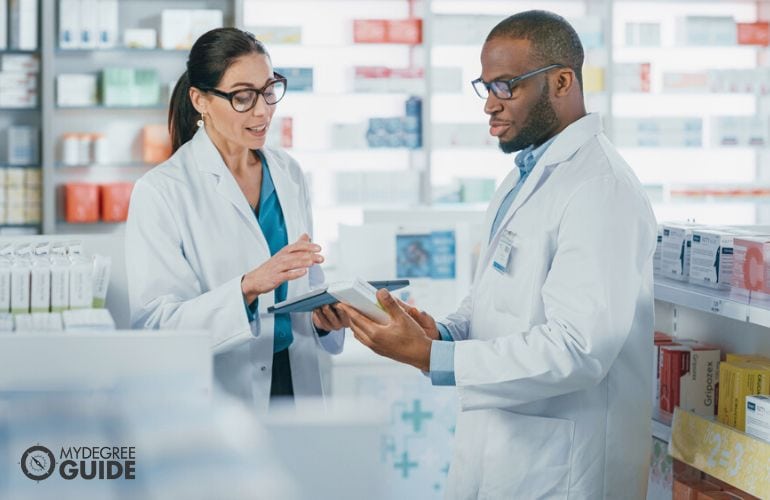
Many graduates use their pharmacy degrees to become licensed pharmacists and work in healthcare settings like hospitals and grocery store pharmacies. This degree can also pave the way for exciting careers in consulting, law, public health, and other sectors.
Editorial Listing ShortCode:
If you want to learn how you can use pharmaceuticals to treat patients, you may consider earning an online Doctor of Pharmacy (PharmD), which is the nest step above online masters in pharmaceutical degrees.
Universities Offering Online Doctor of Pharmacy Degree Programs
Methodology: The following school list is in alphabetical order. To be included, a college or university must be regionally accredited and offer degree programs online or in a hybrid format.
Butler University
Butler University offers an online program for a Doctor of Pharmacy degree. The program aims to provide a holistic education, as well as immersion experiences and pharmacy practice experiences to help develop soft skills.
The program requires the completion of 135 credits of coursework, including Clinical Biochemistry, Pathophysiology, Pharmacist Assessment and Immunization, Introduction to Principles of Drug Action, and more.
Butler University is accredited by the Higher Learning Commission.
Creighton University
Creighton University offers a PharmD degree program online. On-campus 2 week sessions in Omaha are typically required during the summer, through which the completion of labs and hands-on activities takes place. During the regular school year, participation in live virtual meetings and discussions is usually available.
Creighton University is accredited by The Higher Learning Commission of the North Central Association of Colleges and Schools.
D’Youville University
D’Youville University offers an online Doctor of Pharmacy program online. The completion of 141 to 145 credit hours, or about 62 courses, is required, which can usually be finished in 3 years. The program typically includes 6 different pharmacy rotations, which often last 6 weeks each. The program aims to help prepare for careers in research or at clinical and retail pharmacies.
D’Youville is accredited by the Middle States Commission on Higher Education.
Duquesne University
Duquesne University offers a PharmD program online. Potential coursework includes Pharmaceutical Calculations, Pharmaceutical Law and Ethics, and Pharmacy Management and Concepts. The 4 year program requires the completion of 142 credit hours. Over 1,000 hours of experiential education in a variety of settings are also required.
Duquesne University is accredited by the Middle States Commission on Higher Education.
Howard University
Howard University offers a non-traditional Doctor of Pharmacy program typically including courses in a self-paced online format. The program offers the opportunity to experience over 1,000 hours of experiential education rotations. The program is usually completed in 2.5 to 3 years.
Howard University is accredited by the Middle States Commission on Higher Education.
Manchester University
Manchester University offers an online program for a PharmD degree. Most coursework can be completed in an asynchronous format. Some visits to campus for lab experiences and other hands-on learning activities are required. The program requires the completion of 144 credit hours, and typically takes 4 years to finish.
Manchester University is accredited by the Higher Learning Commission.
Massachusetts College of Pharmacy and Health Sciences
The Massachusetts College of Pharmacy and Health Sciences offers a PharmD program in an online, part-time format. The program offers the opportunity to complete up to four 4 week clinical rotations, and to come to campus in Boston for an in-person orientation.
MCPHS is accredited by the New England Commission of Higher Education.
Shenandoah University
Shenandoah University offers an online program for a PharmD program online. Courses are designed to provide experiential learning opportunities and an interactive environment. The program aims to provide the opportunity to join student organizations, make industry connections, and develop leadership skills. A school-issued laptop is typically provided as part of the program.
Shenandoah University is accredited by the Southern Association of Colleges and Schools Commission on Colleges.
St. John Fisher University
St. John Fisher University offers a Pharm.D. program online, but with some on-campus immersion experiences. The program requires the completion of a total of 151 credits, which can typically be completed in 4 years. The program also requires the completion of 2,000 hours of clinical rotations. New admissions are usually granted every fall.
John Fisher University is accredited by the Middle States Commission on Higher Education.
University of Colorado – Anschutz
The University of Colorado–Anschutz offers an online Doctor of Pharmacy program. The program is designed for already licensed pharmacists seeking to continue a clinical education. A choice of 2 pathways within the program are typically offered, American Trained PharmD and International Trained PharmD.
The University of Colorado – Anschutz is accredited by the Higher Learning Commission.
University of Findlay
The University of Findlay offers an online program for a Doctor of Pharmacy program. Attendance is usually required at an on-campus orientation and for 1 week immersion experiences each year in May. Coursework often includes both synchronous and asynchronous elements, which are generally completed in 4 years of full-time study. New admits typically begin every fall.
The University of Findlay is accredited by the Higher Learning Commission.
West Coast University
West Coast University offers a flexible Doctor of Pharmacy program that uses a blend of online and in-person learning. Classes tend to be small, with the aim of providing a supportive, diverse learning community. The program is designed to prepare for the NAPLEX exam, and1 on 1 tutoring is often available. The program is often completed in 3 years of full-time attendance.
West Coast University is accredited by WASC Senior College of University Commission.
Western New England University
Western New England University offers an online program for a Pharm.D. Attendance at on-campus immersion sessions that last 1 to 2 weeks each is required. Experiential learning is required and may be completed at a local pharmacy facility, though they may also be completed in the Springfield area. The curriculum tends to be the same as for the equivalent on-campus program.
Western New England University is accredited by the New England Commission of Higher Education.
Online PharmD Programs

Online pharmacist programs teach students how to use medications to help patients improve their health and well-being.
You can gain comprehensive knowledge of prescription and over-the-counter medications. You can learn about drug-drug interactions, biological and chemical mechanisms of action, and potential side effects. Additionally, Doctor of Pharmacy (PharmD) degrees prepare students for careers as compassionate and professional healthcare providers.
They teach methods for counseling patients, selecting patient-specific medications, and safely dispensing medication. These programs often emphasize the importance of providing access to healthcare to diverse populations as well.
Coursework allows PharmD learners to develop the scientific knowledge and skills that are necessary to work as pharmacists. Classes usually cover topics like:
- Biopharmaceuticals
- Cardiology
- Community practice
- Drug approval process
- Drug development
- Healthcare communications
- Immunology
- Neurology
- Pharmacy laws and ethics
- Pharmacokinetics
- Psychiatry
Pharm.D. programs also include clinical rotations in healthcare environments, such as community health organizations and nursing homes. These experiences let you practice your skills as your treat actual patients under the mentorship of licensed pharmacists. Plus, rotations enable you to explore career opportunities and identify preferred positions.
Graduates are required to earn a pharmacist license and become registered pharmacists (RPh) to dispense medications. The licensing process involves several steps, including passing two examinations and submitting official transcripts to the National Association of Boards of Pharmacy.
Licensed pharmacists can secure positions in many settings, including:
- Assisted living facilities and nursing homes
- Community organizations
- Emergency rooms
- Government
- Grocery stores
- Hospitals
- Intensive care units
- Oncology centers
- Poison control centers
Other graduates use their pharmaceutical knowledge to pursue alternative career paths. Some people become medical writers and produce content for healthcare businesses and websites.
PharmD graduates can also secure positions as pharmacologists and research scientists. These professionals use their analytical and research skills to conduct experiments, develop new medications, and identify potential side effects.
Another popular career path for people who hold this degree is a pharmaceutical sales representative. These experts educate healthcare providers about new medications and their potential benefits for patients. People with a PharmD can also work in postsecondary institutions as educators for the next generations of pharmacy students.
Pharmacy Careers and Salaries
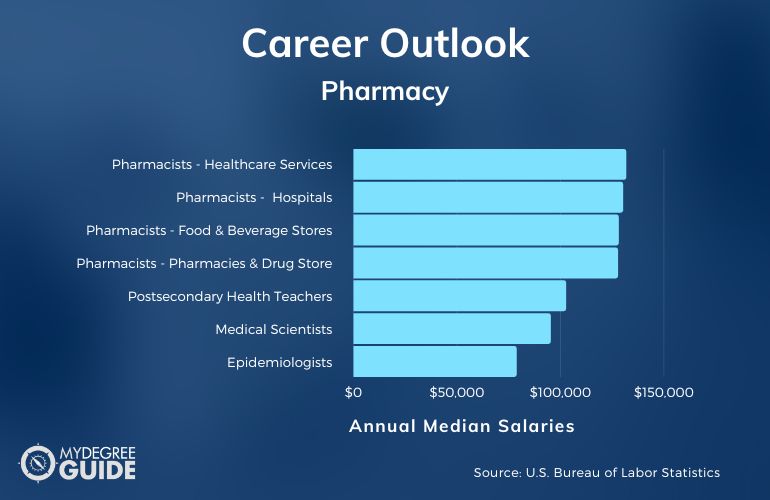
Doctor of Pharmacy degree programs prepare students for numerous careers in healthcare and other industries.
Many PharmD graduates get licensed and become practicing pharmacists. These professionals can have many specialized roles. For instance, regulatory pharmacists ensure that drugs and clinical trials comply with government regulations.
Community pharmacists work in grocery stores, health centers, and independent pharmacies and serve a diverse population of patients. Psychiatric pharmacists specialize in medications used to treat people with emotional and mental disorders.
Compounding pharmacists measure, mix, and prepare custom medications for patients, while oncology pharmacists mix and administer chemotherapy drugs. Oncology pharmacists also collaborate with physicians to ensure that cancer patients receive appropriate treatments.
Drug information pharmacists produce educational materials about medications and answer questions from patients. Meanwhile, industrial pharmacists work for pharmaceutical companies and coordinate the development and manufacturing of medications.
According to the Bureau of Labor Statistics, here are the median salaries of potential career paths for PharmD graduates.
| Careers | Annual Median Salaries |
| Pharmacists — Ambulatory Healthcare Services | $131,790 |
| Pharmacists — Hospitals | $130,280 |
| Pharmacists — Food and Beverage Stores | $128,190 |
| Pharmacists — Pharmacies and Drug Stores | $127,820 |
| Postsecondary Health Specialties Teachers | $102,720 |
| Medical Scientists | $95,310 |
| Epidemiologists | $78,830 |
| Writers and Authors | $69,510 |
| Health Education Specialists | $60,600 |
| Pharmacy Technicians | $36,740 |
People with PharmDs can use their medical knowledge to secure other roles in the healthcare industry. For example, they might work as medical science liaisons, pharmacy benefits managers, and toxicologists. Additionally, some PharmDs pursue careers in academia, consulting, government regulatory affairs, health informatics, insurance, journalism, or sales.
Data from the Bureau of Labor Statistics shows that many of these careers are growing at a faster rate than the average for all occupations. For example, the number of jobs for medical scientists are projected to grow by 17% over the next ten years. Over the same period, positions for postsecondary health specialties teachers are expected to increase by 24%.
PharmD Curriculum & Courses

Online pharmacist programs have diverse curricula, but their courses often teach similar topics and skills. Here are a few courses you may encounter:
- Anatomy and Physiology: You’ll explore each system of the human body and study how drug mechanisms affect them.
- Communications and Counseling Skills: This class covers communication principles and strategies that pharmacists use to develop interpersonal relationships with patients, colleagues, and physicians.
- Drug Discovery and Development: You’ll study drug sources, approaches to drug development, and the approval process for new medications.
- The Emerging Professional: This class focuses on professional behavior for pharmacists, ethical issues in the field, and self-management principles.
- Fundamentals of Immunology: You’ll learn about issues affecting the immune system and the role of immunization.
- Introduction to Diversity: This course examines how race and gender affect attitudes about healthcare and teaches methods to support diverse populations in healthcare settings.
- Pharmacy Law: This class covers laws and regulations that govern pharmacists, including civil liability and malpractice statutes.
- Principles of Biostatistics: You’ll learn how to use statistical methods like distribution models and sampling theory to better understand issues affecting human health.
- Principles of Epidemiology: This course teaches foundational concepts and approaches to chronic disease epidemiology and examines epidemiologic journal articles.
- Research Methods: You’ll learn qualitative and quantitative methods to conduct scientific research and design non-experimental studies of pharmaceutical interventions.
You may also have the opportunity to participate in fieldwork with community organizations.
Admissions Requirements

As you may expect, Doctor of Pharmacy degree programs have more rigorous admissions criteria than undergraduate programs. Specific criteria vary among schools, but standard requirements include:
- Online application and fee
- Immunization records from your physician
- Personal statement about your short-term and long-term goals as a pharmacist
- Pharmacy College Admission Test scores (if required)
- Prerequisite coursework in biology, chemistry, physics, and other relevant subjects
Additionally, many programs require prospective students to complete a criminal background check before enrolling.
Doctor of Pharmacy Programs Accreditation

Accreditation is an important factor to consider as you research online pharmacy colleges. Higher education institutions must pass a strict assessment process to receive regional accreditation. This status demonstrates that a college or university provides a high-quality education on par with other accredited institutions.
Students are required to hold degrees from accredited pharmacy schools in order to take the national licensing exams. Plus, many financial assistance programs only offer aid to students at accredited institutions.
ACPE Accreditation
The Accreditation Council for Pharmacy Education (ACPE) provides programmatic accreditation for Doctor of Pharmacy degree programs.
Colleges and universities are required to meet 25 quality standards established by the ACPE to earn accreditation. These standards cover many areas, including academic environments, financial resources, student services, and strategic plans.
Employers often prefer to hire graduates from ACPE accredited pharmacy schools because they know these students have received a top-notch education that’s up to industry standards.
Pharmacy Licensure and Certifications
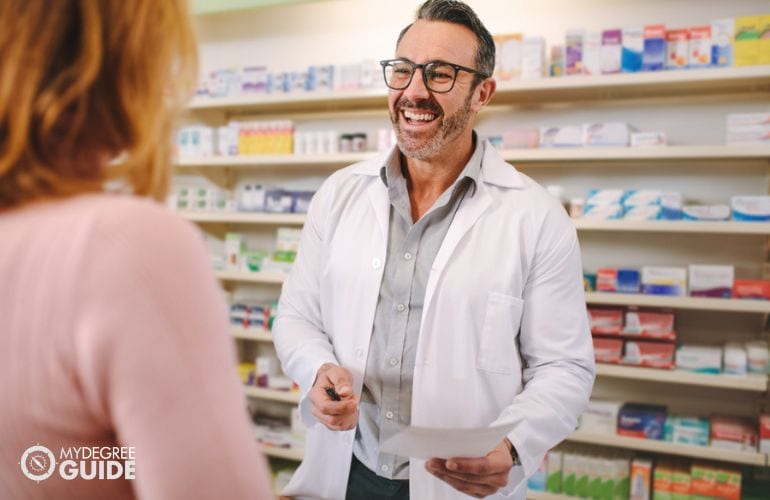
Graduates from pharmacy schools are required to get licensed before they can start working as a pharmacist.
Licensing requirements vary by state but typically involve these three steps:
- North American Pharmacist Licensure Examination (NAPLEX): This test covers entry-level pharmacy skills and topics. Candidates demonstrate knowledge in six areas, including developing treatment plans and performing calculations.
- Multistate Pharmacy Jurisprudence Examination (MPJE): This exam evaluates knowledge of federal and state laws and regulations that govern pharmacists.
- Work experience: Many states require aspiring pharmacists to work a specific number of hours under the supervision of a licensed pharmacist.
It’s beneficial to research your state’s licensing requirements as early as possible.
Financial Aid and Scholarships

Many students pursue financial aid to help them pay for tuition, books, distance learning fees, and other educational expenses.
Many professional organizations offer scholarships for students who enroll in Doctor of Pharmacy degree programs. Some of these opportunities target students who want to specialize in specific niches, like independent pharmacy management or research.
The federal government also provides financial assistance to eligible students. You may meet the criteria for grants, student loans, or work-study programs. You can complete the Free Application for Federal Student Aid (FAFSA) to see if you qualify.
What Is a PharmD?
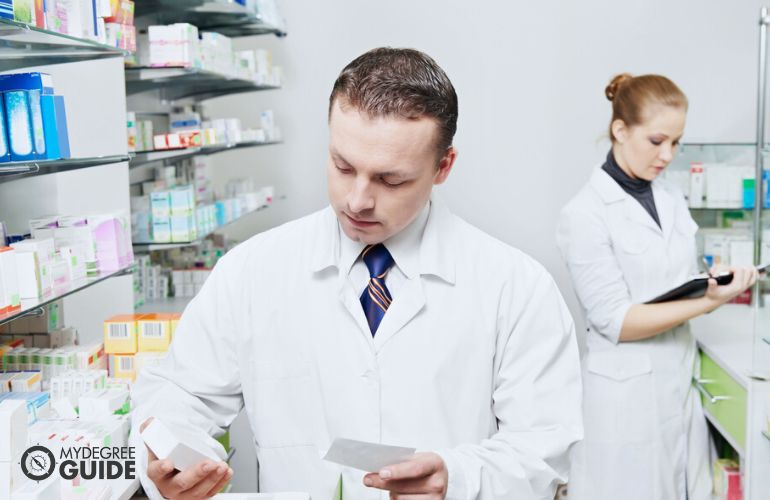
A Doctor of Pharmacy (PharmD) is a professional graduate degree that prepares students for careers in the pharmaceutical industry. This degree provides a comprehensive overview of drug treatments, pharmacy regulations, and interactions between drugs and diseases.
Additionally, a PharmD introduces students to cutting-edge developments in pharmaceuticals. Courses may cover innovative topics like biotechnology, health informatics, and personalized medicine. Online pharmacist programs also include experiential learning opportunities to help students hone their professional skills.
For instance, PharmD students often complete clinical rotations and internships with government agencies, hospitals, and retail pharmacies.
What Can You Do with a PharmD Degree?
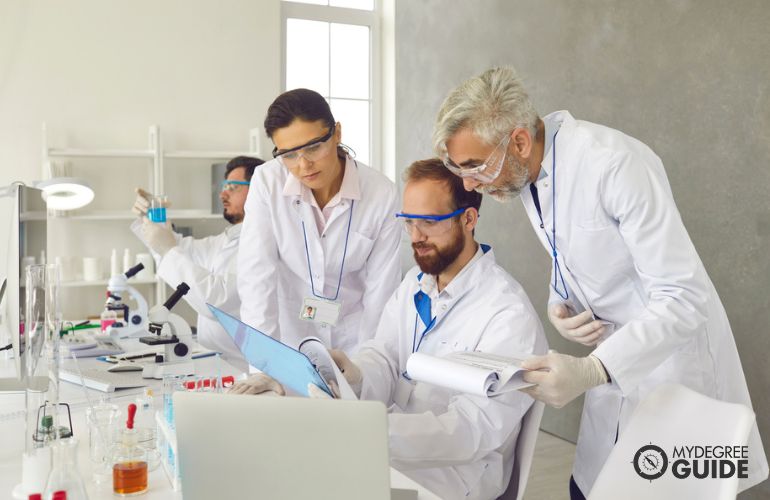
A PharmD can unlock a wide array of career opportunities. Most commonly, this degree can help students qualify for positions as pharmacists. These professionals dispense medications, counsel patients, and bill insurance. Pharmacists can specialize in many areas, like immunology, oncology, and pediatrics.
Graduates can also pursue related healthcare careers. Some people work as medical educators or science writers, and they use their pharmaceutical expertise to share information about medications. Others work for pharmaceutical companies as researchers or sales representatives. These professionals usually don’t work directly with patients, but they still draw on their training to develop or promote medications.
Are Pharmacists Doctors?
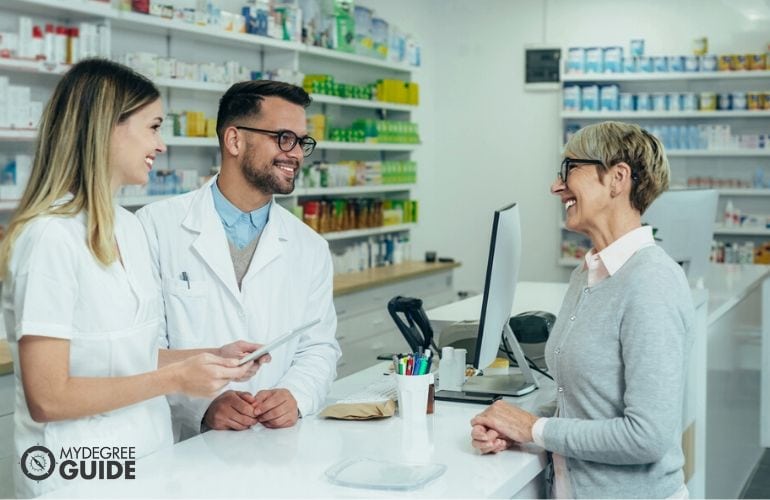
A PharmD is a professional doctorate, so pharmacists are doctors. But, a PharmD is not equivalent to a Doctor of Medicine (MD).
Here are a few crucial differences between these degrees:
- Education: A PharmD typically takes 4 years to complete. By contrast, an MD takes 4 to 6 years, and physicians participate in an additional residency for 5 to 8 years.
- Responsibilities: Pharmacists dispense medications, but they don’t diagnose patients. Physicians have a wider range of duties, including developing treatment plans, monitoring symptoms, and performing surgeries.
Enrolling in a PharmD allows students to focus on pharmaceuticals.
How Long Does It Take to Get a PharmD Online?

The timeline to complete a PharmD varies by program. Depending on the required number of credit hours and clinical rotations, a doctorate typically takes 3 to 5 years to complete.
Many pharmacy schools offer accelerated degrees, though. These programs allow students to earn a 3 year bachelor’s degree in biology or chemistry and a 4 year PharmD. If you choose this option, you may complete both degrees in 7 years instead of the traditional 8. Some online pharmacy colleges allow students to enroll part-time, extending the length of the program.
What’s the Difference Between Pharmacology vs. Pharmacy Doctorate Programs?
Like a PharmD, a doctorate in pharmacology enables students to develop expertise in pharmaceuticals. But these degrees have several differences.
| Doctorate in Pharmacy | Doctorate in Pharmacology |
|
|
If you want to work directly with patients, a PharmD will prepare you to work in clinical settings. By contrast, a doctorate in pharmacology can help qualify you for a research-based career.
Is a Doctor of Pharmacy Degree Worth It?

Yes, a Doctor of Pharmacy degree is worth it for many students. This degree allows you to expand your knowledge of biochemistry, medications, and the pharmaceutical industry. You can also develop valuable interpersonal skills like communication and collaboration. Graduates who earn an RPh degree often become licensed pharmacists.
The Bureau of Labor Statistics predicts that around 13,600 new jobs will open for pharmacists each year over the next ten years. These experts find employment in many healthcare environments, including grocery store pharmacies, mail-order pharmacies, and medical practices. This flexible degree can also open job opportunities in education, insurance, sales, and other industries.
Getting Your PharmD Online

Online pharmacist programs enable students to enrich their knowledge of the human body and pharmaceuticals.
You can study a broad range of topics, including epidemiology, immunology, and drug development. A PharmD may also help you develop crucial skills like critical analysis, multitasking, and teamwork.
Graduates with PharmDs pursue various career paths. Many become licensed pharmacists, but others secure pharmacy-adjacent positions. For instance, graduates might become medical writers or pharmacy benefits managers.
If a PharmD sounds like the right degree for you, you can get started today by researching accredited online pharmacy colleges.
